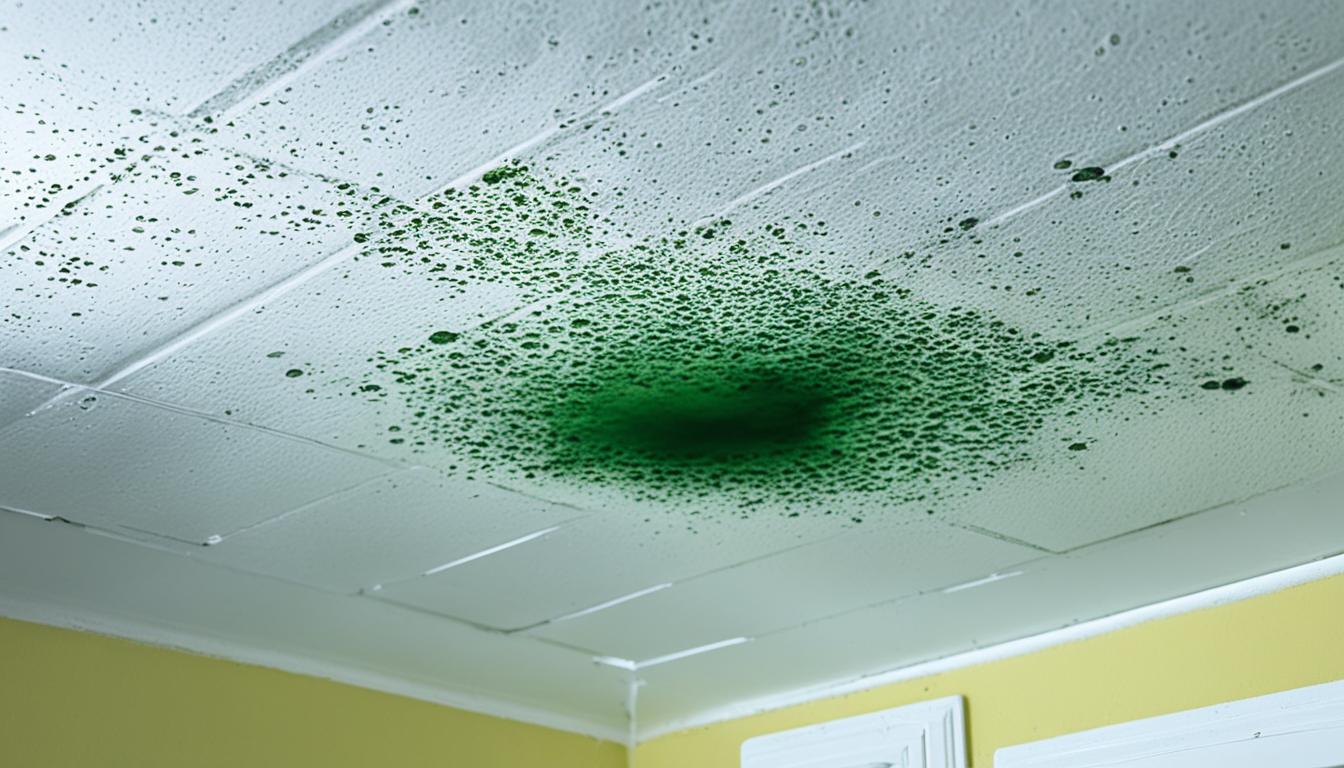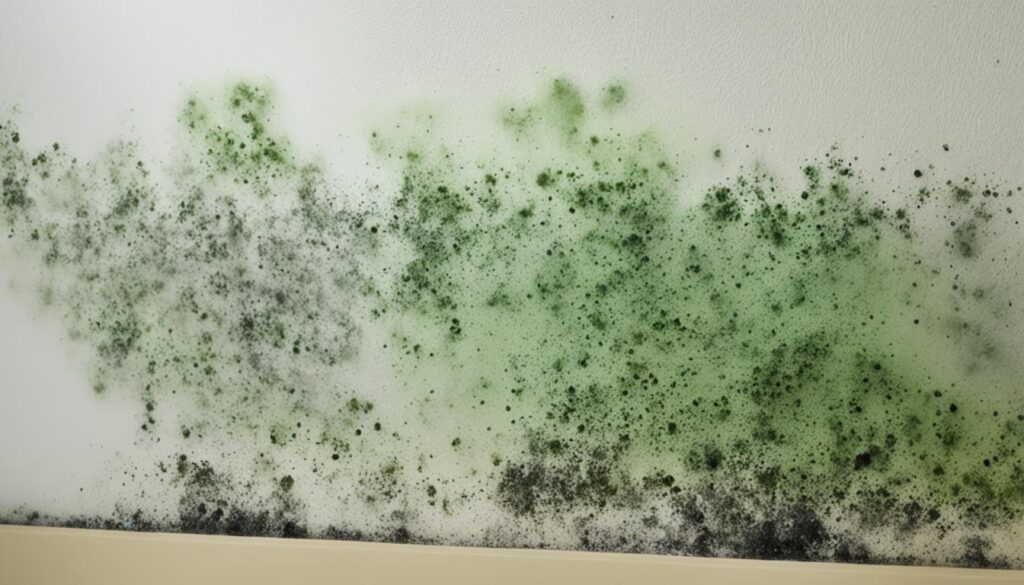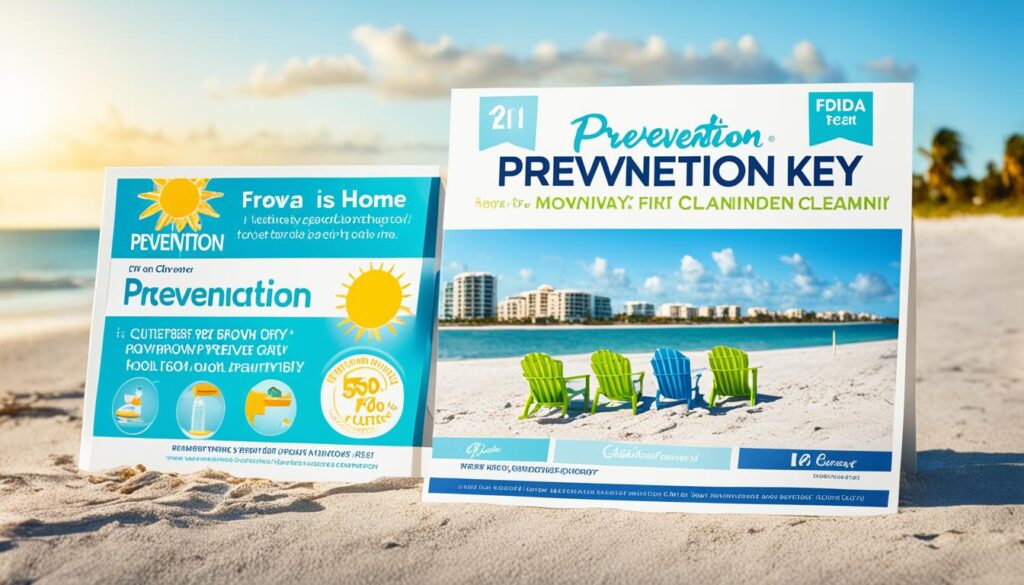
Mold Growth Florida: Prevention & Remediation Tips
Welcome to our article on mold growth prevention and remediation tips specifically tailored for the state of Florida. With its humid climate, Florida is prone to mold issues, which can pose risks to both your property and health. In this section, we will explore the various factors that contribute to mold growth in Florida and provide valuable insights on how to prevent and remedy this common problem.
Key Takeaways:
- Florida’s humid climate creates the perfect breeding ground for mold growth.
- Mold exposure can lead to various health risks, including allergies, respiratory problems, and other adverse effects.
- Preventing mold growth in Florida requires implementing measures such as controlling humidity levels, ensuring proper ventilation, and promptly repairing any leaks.
- In the event of mold growth, it is important to take immediate action and hire professionals for proper remediation.
- Regular maintenance and indoor air quality management are essential for preventing future mold growth in your Florida property.
Understanding Mold Growth in Florida
Before we delve into prevention and remediation strategies, it’s crucial to understand the factors that contribute to mold growth in Florida. The state’s humid climate, combined with other environmental conditions, creates an ideal breeding ground for mold. Additionally, various mold species thrive in Florida, posing potential health risks to occupants of affected properties.
The Humid Climate
Florida’s climate is characterized by high humidity levels throughout the year. The warm temperatures and abundant moisture create an environment where mold can flourish. When air is saturated with moisture, it can condense on surfaces, providing the necessary conditions for mold spore germination and growth.
Common Mold Species
Florida is home to several mold species commonly found in indoor environments. These include but are not limited to:
- Aspergillus
- Cladosporium
- Penicillium
- Alternaria
- Stachybotrys chartarum (also known as “black mold”)
Each mold species has unique characteristics and may pose varying health risks. Some molds produce allergens, irritants, or even toxic substances called mycotoxins, which can lead to adverse health effects when inhaled or touched.
Potential Health Risks
Mold exposure can lead to a range of health issues, particularly for those with respiratory conditions, allergies, or weakened immune systems. Common symptoms associated with mold exposure include nasal congestion, coughing, sneezing, throat irritation, and eye or skin irritation. Prolonged exposure to mold may exacerbate existing health conditions and lead to more severe respiratory or allergic reactions.
“Florida’s humid climate and the presence of common mold species create an environment conducive to mold growth and potential health risks. Understanding these factors is essential for effective mold prevention and remediation.”

| Mold Species | Characteristics |
|---|---|
| Aspergillus | Commonly found indoors. Can cause respiratory issues and allergic reactions. |
| Cladosporium | Appears as green, brown, or black colonies. Can trigger allergies and asthma. |
| Penicillium | Produces musty odors and can cause respiratory symptoms and allergic reactions. |
| Alternaria | Common outdoor mold. Can trigger allergies and asthma when present indoors. |
| Stachybotrys chartarum (black mold) | Produces mycotoxins that can cause severe health issues. Requires professional remediation. |
Prevention Tips for Mold Growth in Florida
To minimize the risk of mold growth in your home or property in Florida, it’s crucial to implement effective prevention measures. By following these practical tips, you can maintain a healthy living environment and safeguard your property.
Control Humidity Levels
Excessive humidity is a common trigger for mold growth. Keep indoor humidity levels below 50% by using dehumidifiers or air conditioners. Consider investing in a hygrometer to monitor humidity levels accurately.
Ensure Proper Ventilation
Proper ventilation is key to preventing mold growth. Make sure your home has adequate ventilation in areas prone to moisture buildup, such as bathrooms, kitchens, and laundry rooms. Install and use exhaust fans to remove excess moisture.
Repair Leaks
Address any leaks or water damage promptly. Inspect your plumbing regularly and fix any leaks immediately. Repair any cracks or gaps in your roof, windows, or walls that may allow moisture to enter your home.
Maintain Good Indoor Air Quality
Ensure good airflow throughout your home by keeping furniture away from walls and allowing air to circulate freely. Use air purifiers with high-efficiency particulate air (HEPA) filters to remove airborne mold spores and improve indoor air quality.
Keep Your Property Well-Maintained
Maintaining your property is essential in preventing mold growth. Clean and dry any water-damaged areas within 24-48 hours to prevent mold spores from settling and thriving. Regularly clean and dust your home, including carpets, upholstery, and curtains, to minimize mold spore buildup.

Implementing these prevention tips can significantly reduce the risk of mold growth in your Florida property. Stay proactive and vigilant to ensure a mold-free environment for you and your family.
Remediation Strategies for Mold Growth in Florida
In the unfortunate event that mold growth occurs in your Florida property, taking immediate action is crucial to mitigate the problem and safeguard the health of occupants. Effective mold remediation involves a systematic approach that includes hiring professional services, assessing the extent of contamination, employing proper mold removal procedures, and implementing preventive measures to avoid future mold growth.
Hiring Professional Services
When facing mold growth, it is advisable to seek the expertise of professionals experienced in mold remediation. Professional mold remediation companies, like MoldAway Florida, have the knowledge, tools, and resources to handle mold infestations effectively. They follow established industry standards to ensure thorough and safe mold removal.
Assessing Contamination Level
Before starting the remediation process, it is essential to assess the extent of mold contamination. Professionals can conduct a comprehensive inspection, identifying the areas affected and the potential causes. This evaluation helps develop an appropriate remediation plan tailored to your specific situation.
Proper Mold Removal Procedures
Mold removal requires following strict protocols to minimize further spread and ensure safe elimination. Depending on the severity of the infestation, remediation may involve steps such as containment, air filtration, removal of affected materials, thorough cleaning, and applying antimicrobial treatments to prevent regrowth.
Note: Mold removal procedures should only be performed by trained professionals equipped with necessary personal protective equipment (PPE) to safeguard their health and prevent cross-contamination.
Preventing Future Mold Growth
Once mold has been successfully remediated, preventing its recurrence is essential to maintain a healthy indoor environment. Implementing preventive measures can help reduce the likelihood of mold growth in the future. These measures include maintaining proper ventilation, controlling humidity levels, promptly repairing leaks or water damage, and regularly inspecting and maintaining HVAC systems.
By following these remediation strategies, you can effectively address mold growth in your Florida property, ensuring the well-being of occupants and preventing further damage.
Conclusion
Mold growth is a common issue in Florida, primarily due to its humid climate. The warm and moist environment provides the perfect conditions for mold to thrive and spread. However, by implementing effective prevention strategies and promptly addressing any mold growth with proper remediation techniques, you can maintain a healthier living environment.
Prevention is key when it comes to mold growth in Florida. It’s important to control humidity levels in your home or property, as excessive moisture can lead to mold infestations. Regularly check for and repair any leaks, as even a small water leak can create a breeding ground for mold. Ensuring proper ventilation and improving airflow can also help prevent mold growth. Additionally, maintaining good indoor air quality by using air purifiers and regularly cleaning and inspecting your property can further reduce the risk of mold.
In the unfortunate event that you do find mold growth in your Florida property, it’s essential to take prompt action for remediation. Engaging the services of professionals who specialize in mold assessments and remediation, such as Fix Mold Miami, can help ensure that the mold is safely and effectively removed. They have the expertise and equipment to identify the extent of the contamination, conduct proper mold removal procedures, and implement preventive measures to reduce the likelihood of future mold growth.
To safeguard your health and property, if you suspect mold growth or want to prevent it, consult experienced professionals. Fix Mold Miami can assist you with mold assessments and provide professional remediation services. Give them a call at 305-465-6653 to take the necessary steps in protecting your home from mold in Florida.




